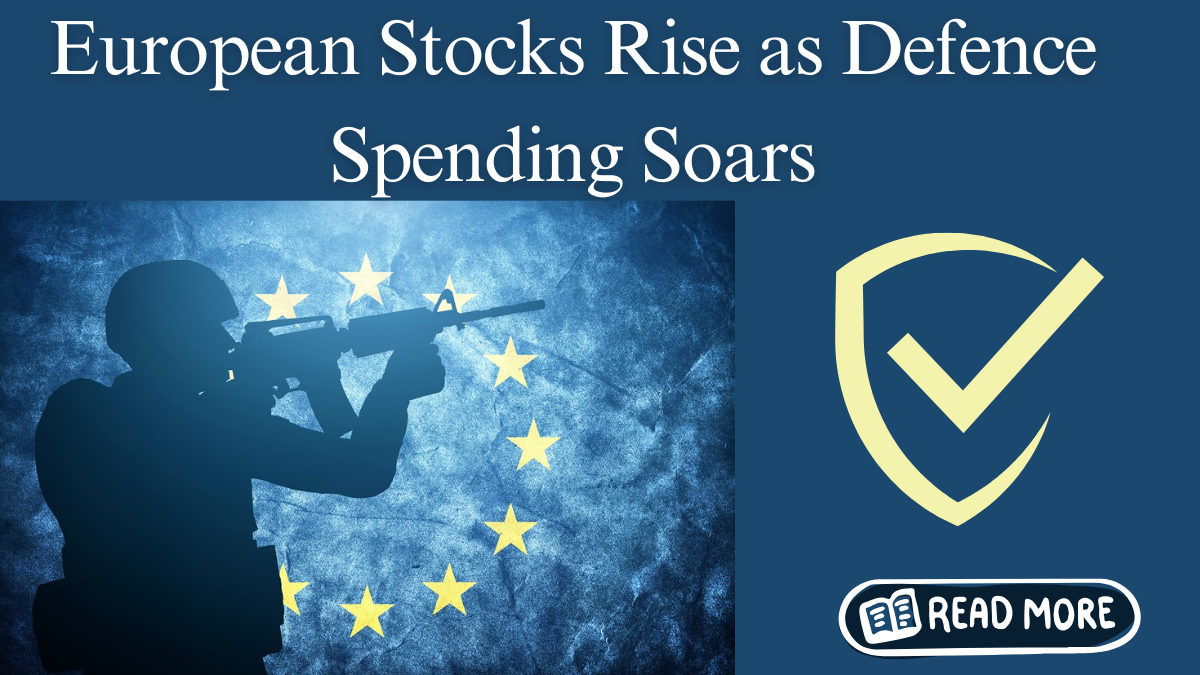European stocks have experienced a notable uptick, driven largely by a pledge to increase defence spending across several countries in the region. This move has been widely seen as a response to growing security concerns and shifting geopolitical landscapes. The global financial markets are responding to this announcement, which has implications not only for the defence sector but for broader market movements. This article takes a closer look at the key developments influencing European markets and explores how this increased defence spending is affecting stock performance.

European Stocks and Defence Spending
The announcement of increased defence spending by several European nations has given a boost to the stock market, particularly for those companies operating in the defence and aerospace sectors. Countries are focusing more on strengthening their military capabilities, which has led to higher demand for arms, technology, and related services.
Key Points of Defence Spending Pledge:
- European Union (EU) members are expected to commit more funds to their military budgets, aligning with NATO’s goal of spending 2% of GDP on defence.
- This shift is primarily in response to increasing tensions and security concerns, particularly in the wake of the Russian invasion of Ukraine and rising geopolitical uncertainty.
- Stock market reaction has been largely positive, as defence contractors and related companies anticipate a surge in demand for their products and services.
Key Sectors Benefiting from Defence Spending
The surge in defence spending has benefited not only the broader European stock market but also specific sectors within it. Some of the key sectors to watch include:
- Defence and Aerospace:
- Companies like Airbus and Dassault Aviation are poised to see a rise in their orders due to increasing military procurement.
- Investments in military technology and cybersecurity have surged, leading to higher stock prices for companies in these industries.
- Energy and Commodities:
- Energy security remains a critical component of European defence strategies. As countries seek energy independence from unstable regions, companies in the renewable energy and natural gas sectors are also experiencing gains.
- Technology:
- Tech firms focusing on military-grade technology, including artificial intelligence, automation, and robotics, are witnessing stronger market performance as governments increase investments in technological warfare and defence systems.
Global Market Impact
While European stocks rise due to this pledge, there are broader global market implications. The increased defence spending is a signal of economic rebalancing, with countries prioritising security and defense in an increasingly volatile world.
- US markets have also been reflecting a similar trend, as increased government spending on defence can lead to higher earnings for defence-related companies in both Europe and North America.
- Asian markets are reacting cautiously, as regional security dynamics may shift in response to Europe’s growing military investments, particularly in relation to their strategic alignment with NATO.
Other Key Financial News
In addition to the defence spending pledges, here are a few other significant financial updates making headlines globally:
- Inflation in the Eurozone continues to be a major concern. Consumer prices have been rising, and the European Central Bank (ECB) is under pressure to address inflationary concerns while ensuring economic growth remains steady.
- Interest Rates and Economic Growth: The ECB and Federal Reserve are facing growing scrutiny on their respective monetary policies, with experts debating the future trajectory of interest rate hikes and their impact on economic expansion.
- Corporate Earnings Reports: As the second-quarter earnings season kicks off, there is a notable focus on technology and financial sectors, with several high-profile companies reporting earnings that either exceeded or missed market expectations.
Conclusion
European stocks have shown positive momentum, driven largely by the promise of increased defence spending, as nations ramp up efforts to bolster their military capabilities. This surge in military and technological investments is influencing market performance, particularly for companies in the defence, energy, and technology sectors.
As the geopolitical landscape continues to evolve, defence spending is expected to remain a key pillar of growth for European markets. Alongside this, other financial factors such as inflation, interest rates, and corporate earnings reports are shaping the global financial outlook, making it essential for investors to keep a close eye on these developments.
With growing security concerns across the world, it is clear that defence spending is becoming a central theme in global finance, leading to shifts in market dynamics and creating both opportunities and challenges for investors.
People May Ask
What is driving the recent rise in European stocks?
The recent rise in European stocks is primarily driven by the announcement of increased defence spending across several European countries. This is seen as a response to growing geopolitical tensions, particularly the ongoing conflict in Ukraine.
Which sectors are benefiting from the increased defence spending in Europe?
The sectors that stand to benefit the most from increased defence spending include defence and aerospace, energy, and technology. Companies in these industries are expected to see higher demand for products and services related to military procurement and energy security.
How does increased defence spending affect global markets?
Increased defence spending in Europe is contributing to a positive outlook in US markets as well, particularly for defence-related companies. However, markets in Asia are approaching the situation with caution, considering potential shifts in regional security dynamics.
What are the other significant financial developments in Europe?
Other key financial developments include rising inflation in the Eurozone, with concerns over how the European Central Bank (ECB) will address inflation while ensuring steady economic growth. Additionally, interest rates and corporate earnings reports are also influencing financial markets globally.
Click here to learn more.
Pari is a passionate writer known for captivating stories that blend imagination and reality. Inspired by travel, history, and everyday moments, Pari crafts narratives that resonate deeply with readers.
